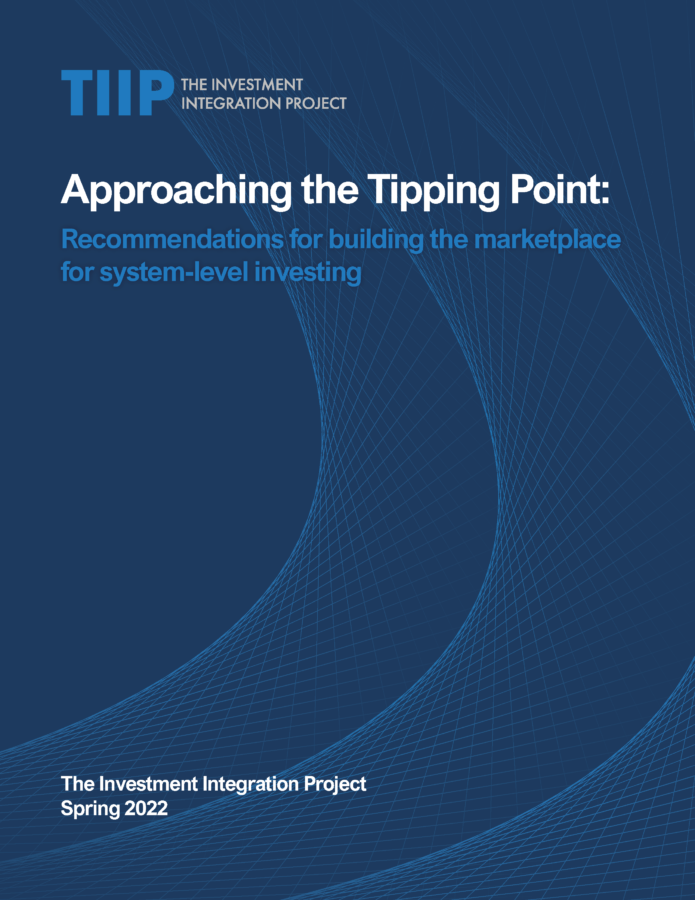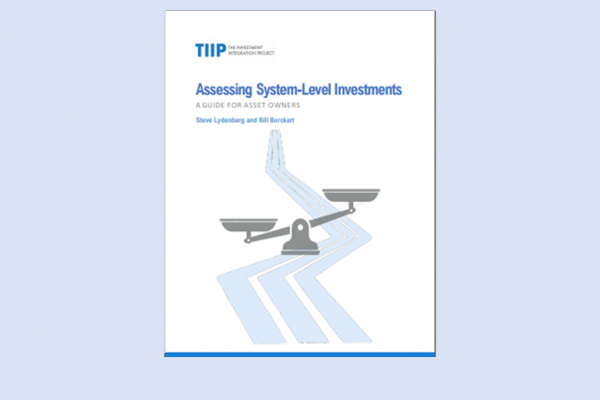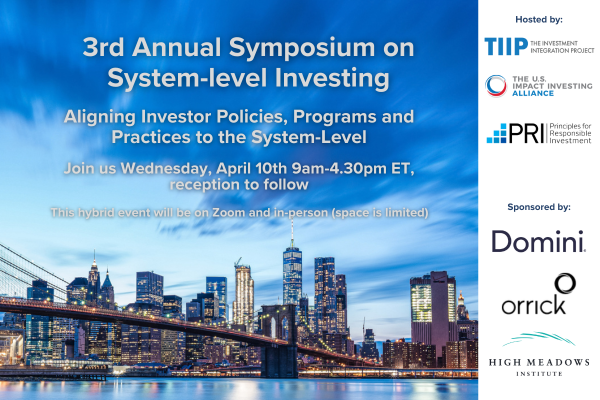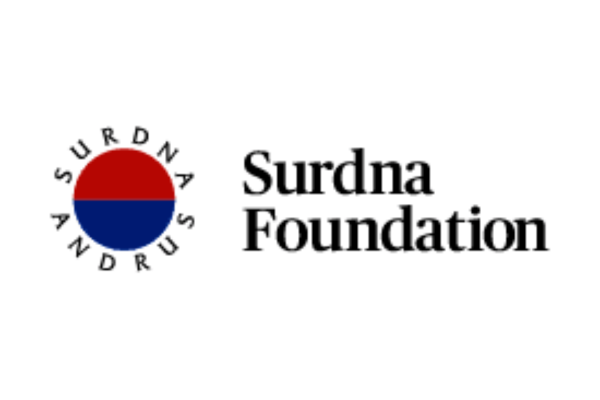Co-produced with Humanity United and the UBS Optimus Foundation, report highlights actions investors can take now to accelerate an industry-wide embrace of system-level investing.
 NEW YORK, June 7, 2022–The Investment Integration Project (TIIP), an applied research and consulting services firm, today released a comprehensive new report that gives investors a roadmap to addressing systemic social, environmental, and financial issues.
NEW YORK, June 7, 2022–The Investment Integration Project (TIIP), an applied research and consulting services firm, today released a comprehensive new report that gives investors a roadmap to addressing systemic social, environmental, and financial issues.
The report, Approaching the Tipping Point: Recommendations for building the marketplace for system-level investing, focuses on actions investors and other market participants can take over the next two to five years to quickly equip the financial industry with tools and strategies to manage existing systemic social and environmental challenges and drive broader industry transformation.
“Whether it’s climate change, income inequality or a host of other stressors, systemic challenges are pushing investors to a tipping point,” said TIIP CEO William Burckart. “The long-term performance of investments and global well-being will depend not only on acknowledging systemic issues, but on taking bold action to do something about them.”
The report’s recommendations are informed by a survey of nearly 100 investors and other industry stakeholders and a series of detailed focus groups and interviews that posed three fundamental questions:
- Do asset owners, intermediaries, and other financial industry stakeholders understand what system-level investing is?
- Are they ready to adopt system-level investing approaches?
- What is the path forward for the financial industry and toward industry transformation?
The work was supported by Humanity United and the UBS Optimus Foundation, two organizations that recognize the urgency of addressing systemic social challenges and the importance of investors’ leadership in the transition to a sustainable economy.
The State of the Industry
Approaching the Tipping Point found that industry stakeholders are concerned about systemic social and environmental issues and their interconnection with the financial industry. However, many do not know how to address these issues or use approaches like system-level investing to do so. They are also unclear on how system-level investing differs from more well-known approaches like ESG integration.
Several roadblocks, including capacity constraints, regulatory uncertainty and an ingrained industry culture are stifling broader adoption of system-level investing. To overcome the roadblocks, the report found that industry stakeholders need information about the basics of system-level investing; the business and legal case for adopting it; straightforward “plug-and-play” guidance for how to do so; and opportunities to engage in group learning, collaborate, and exchange ideas and best practices.
“It is time to accelerate system-level investing progress beyond its current phase of uncoordinated innovation—defined by a group of “disruptive innovators” executing disparate entrepreneurial activities—to build the market by formalizing centers of ideas and activities and to develop a shared infrastructure,” noted Jessica Ziegler, Director for Research at TIIP. “Doing so will set the financial industry on a course toward capturing the value of the marketplace and, ultimately, maturity, ensuring that it can manage systemic social and environmental challenges over time.”
The Path Forward
Approaching the Tipping Point also outlines a two-phase plan for meeting the financial industry where it is and equipping investors with tools and strategies to manage systemic social and environmental challenges. It first focuses on building awareness for system-level investing before turning to enabling widespread adoption of the approach.
The awareness phase emphasizes answering the what, why, and how of system-level investing and breaking down the approach – a seemingly big, daunting idea – into its component parts to make it more digestible. And it responds to the financial industry’s requests to receive key information about system-level investing via plug-and-play tools and for a community of practice. The adoption phase provides recommendations for galvanizing action around needed regulatory change and equipping investors with the tools necessary to evaluate the impacts of their system-level investing efforts.
The report calls for initially targeting asset owners with long-term interests, such as pension funds and foundations, assuming their increased demand for system-level investing will drive activity by the remainder of the industry.
“Taken together, the goals and activities outlined in Approaching the Tipping Point will help to shift the culture of the financial industry away from a near exclusive focus on the short term and help to transform it into an industry that balances this short-termism with minimizing systemic risks, building value over the long-term and developing resilient systems that support investment across all asset classes,” said Waseem Mardini, Manager, Forced Labor and Human Trafficking, Humanity United.
Access the report here.



